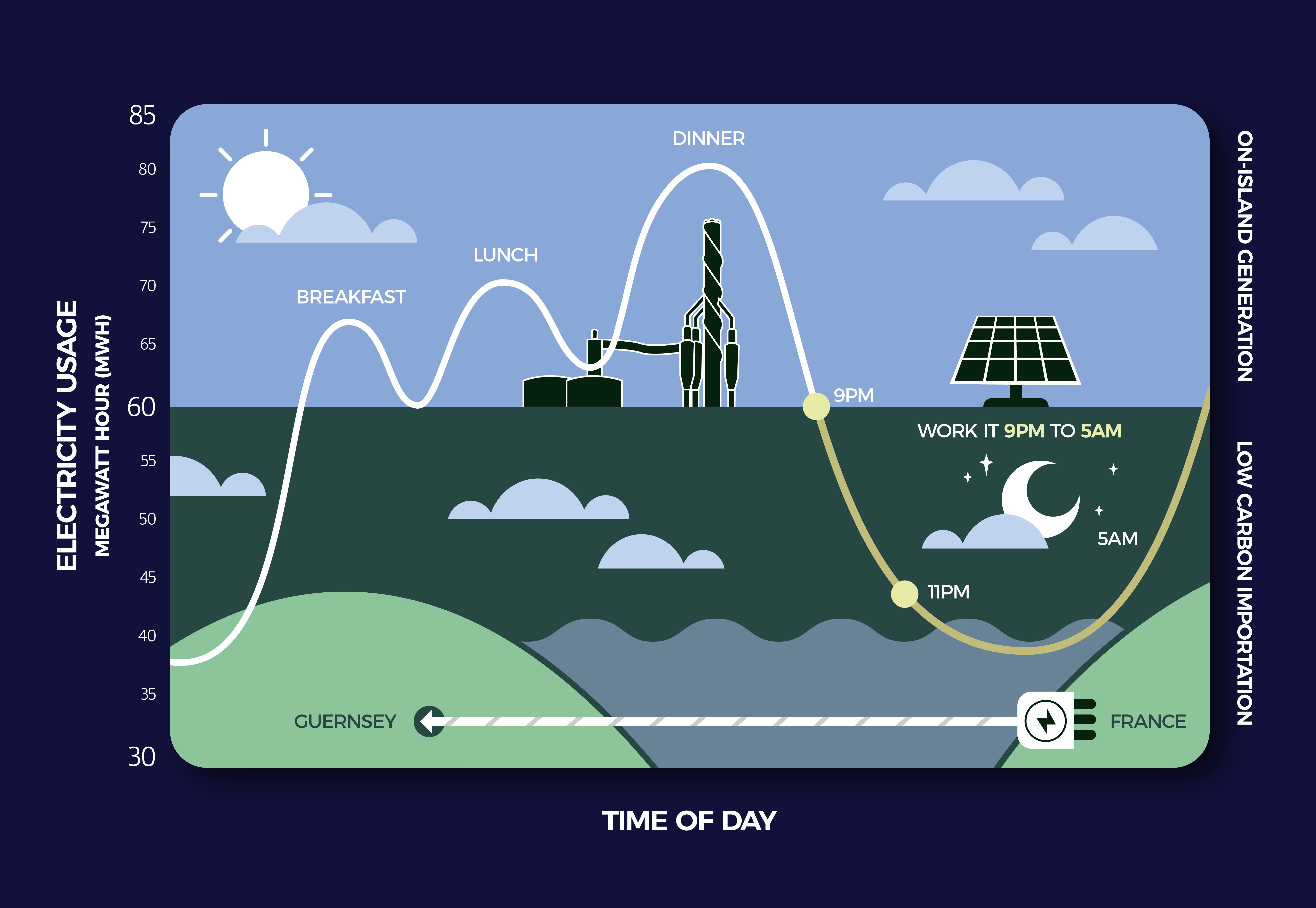Off-Peak Heating

Cleaner, more efficient heating for your home powered by over 90% low-carbon energy.
-
100% Efficient
This means every £1 you spend on electricity will give you £1 worth of heat for your home. A new gas or oil boiler will always be less than 100% efficient and will become even less efficient as they age.
-
Guaranteed Application Acceptance
Your installer will need to apply for 'additional load' for any electric heating installation. The good news is that we can guarantee acceptance for any applications for Off-Peak Heating up to 18kW, which means most 1- and 2-bedroom homes could benefit - and a good few 3-bedroom properties too.
-
Cheaper to run
Like a battery, Off-Peak Heating systems bank power during your Super Economy 12 'Low-Rate' overnight time bands, which is the cheapest tariff to run electric heating from here in Guernsey.

Overnight is the cheapest, cleanest time to use electricity for customers on an Economy 12 tariff.
Heat energy is often the biggest part of your bill, so wouldn't it be great to store up that energy during your low-rate times and use it when you need it? That's precisely how Off-Peak Storage Heating works.
Battery storage technology gets mentioned frequently in the news, and the good news is we already have the technology and systems in place to store up heat energy for you. Storage heating uses clever systems that maximise off-peak (low-rate) electricity to heat up specialised storage bricks within the heaters. These clay or ceramic bricks act like a reservoir, absorbing your cheaper overnight electricity, then storing it as thermal energy ready to use the next day.
And just like modern hot water cylinders, storage heater units are well insulated to minimise heat loss and your heating bill.
Modern Off-Peak Storage Heaters work just like other dry heating systems and are easily controllable, giving you the heat you need when you need it.
Don’t wait for your boiler to break midwinter to make the change.
Spring and Summer are the best time to make the switch. As with a house extension or roof replacement, it takes time but is worthwhile.

Important: What you need to know before you switch to electric storage heating
-
Step 1
We will provide you with a free home survey to understand what your property needs.
-
Step 2
Once you have accepted your quote, an 'Additional Load' application will be submitted, which is a process to check if the incoming electricity supply and surrounding network is substantial enough for the additional electricity ‘load’ needed to power your heating system.
WE GUARANTEE TO ACCEPT ALL OFF-PEAK HEATING APPLICATIONS FOR LOAD UP TO 18KW
-
Step 3
When you book a home visit with Guernsey Electricity, one of our advisors will calculate the heat loss specific to your property and provide you with a quote based on your property needs.
Power Supply
It’s really important to plan ahead and check if your property needs a supply line cable upgrade.
Electricity is delivered to your door through an underground network of cables. Some properties don’t have enough capacity in the existing service cable to supply a new heating system ad will need a service upgrade.
Your installer can check with Guernsey Electricity by submitting an additional load application if your property needs a supply line cable upgrade
Frequently asked questions
Making the switch to electric heating is a fantastic investment for your property. Like any property upgrade, the installation will take time to complete and we want to help answer your questions before you make the decision to change.
We recommend checking current prices and tariffs online first.
Heating systems only replace the volume of heat lost from your property, which means property insulation is the most effective way to reduce the running costs of any heating system.
Off-Peak Storage Heating
This heating system runs on the cheapest tariff available for electric heating as, like a battery, they're designed to store heat energy during your low-rate overnight periods. This cheaper stored heat can then be used during the day as and when you need it.
Please check our Super Economy 12 'Low-Rate' prices here. Your low-rate time bands are printed on the back of your electricity bill.
Electric Boilers and Underfloor Heating
These run on the Superheat Tariff.
Electric heating is costs significantly less to run than gas heating in Guernsey.
Oil is one of the cheapest commodities and although oil heating systems may initially have a lower running cost when new at around 91% efficiency, over time the cost to run your oil heating will increase as your boiler's efficiency decreases.
Some customers have replaced oil boilers working at less than 70% efficiency, meaning over 30% of their bill was used to pay for waste greenhouse gas emissions rather than valuable heat for their home.
Air Source Heat Pumps
This is the least expensive way to heat a property and runs on the Heat Pump tariff.
Unlike other heating systems, air source heat pumps provide three times as much energy as is put in. This means that for every £1 spent on electricity to run the heat pump, you could generate £3 worth of heat for your property.
If you currently heat your property with a traditional electric heating system*, a gas or oil system, you will significantly cut your carbon emissions by moving to an Off-Peak Storage Heating System.
This is because we import around 60MW of electricity from low-carbon sources from the European grid, and all additional demand is topped up from the Vale power station. As Off Peak Storage Heaters store power during overnight off-peak times on the grid, it can be powered using 100% low-carbon electricity.

*Air source heat pumps will help you significantly reduce your carbon footprint too.
No - unless you are replacing an existing electric heating system. However, your preferred installer will always do their best to provide a solution in an emergency.
Switching to an electric system is a positive development for your property and similar to other property improvements such as extensions and roof renovations, it will take time to complete.
Lead times will vary depending on workload and availability, and it is worth preparing for your switch to electric heating well in advance. Please be aware that your property may need a supply line cable upgrade which will add to the timeframe.
We also recommend switching during the spring and summer months when possible so the work can be carried out when you do not need to use the heating. Depending on the work required, it may take several weeks from start to finish.
There will be a different answer to this question for each property depending on:
- the network infrastructure in your area
- the supply line cable connecting your property to the network, and;
- how much electricity other properties around you are using
Your neighbour may be in a different position to you if, for example, they had electric heating installed a few years ago, or the network serving their property is from a different substation.
Your installer will submit an Additional Load Form to Guernsey Electricity's new connections team to establish if there is enough power in the surrounding cable network to power an electric heating system in your property.
Replacing your gas or oil boiler whilst retaining your existing radiators is the quickest and most simple option. This is known as a ‘wet system’ as it relies on water heated by electricity to be pumped around the property.
Moving to electric radiators is known as a ‘dry’ system.
This doesn’t need a boiler and all existing radiators linked by pipework can be removed. Electric radiators are then installed throughout the home with a cable supplying each radiator to power it individually. This means each radiator is powered independently and has its own programmer and thermostat.
The main benefits of a dry electric heating system are:
- no water pumped around the property which reduces the risk of leaks.
- if one radiator fails, the others will still work unlike a wet system where if the boiler fails, there is no heat for the home.
- each room can have accurate temperature control e.g. your lounge can be warm and cosy at 21°C, and the spare room can be as low as 12°C just to keep it aired.
If the supply line cable supplying your property has sufficient capacity, you will not need an upgrade. However to find this out, your installer will need to submit an 'additional load' application.











